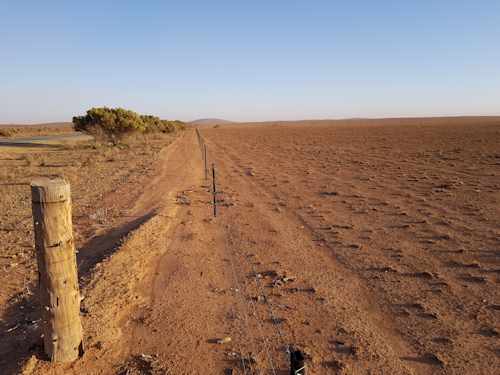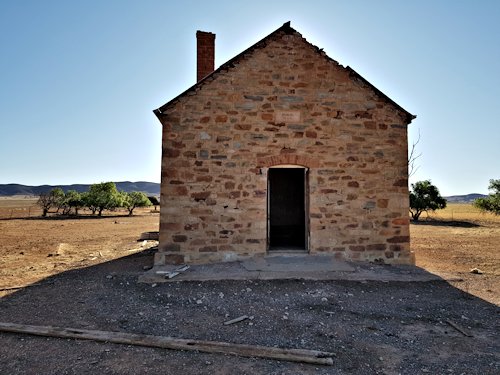I was there...
 I was there.
I was there.
I'm fresh back from 800kms pedalled over three days, with two of those headed into 30 to 40 kmh winds. The apocalyptic image of an old abandoned church keeps floating into my vision, and I hear echoes of gospel lyrics. I thought that this morning I would read John 9, and then get some more sleep. But I realise I was there, and now I'm wide awake, and shaking.
 John has a few inaccuracies of course. Details can develop in the telling. It was no anonymous man who had been blind from birth, it was a woman, a friend of mine, who realised her blindness, and started asking questions at church.
John has a few inaccuracies of course. Details can develop in the telling. It was no anonymous man who had been blind from birth, it was a woman, a friend of mine, who realised her blindness, and started asking questions at church.
Her name means Christ-bearer, which makes me laugh, because the nearest John comes to giving his anthrōpon a name, is here: "He kept saying, 'I am the man.'" It's a Johannine Dad joke, a way of writing I am the man several times on the page to open our eyes to what he is saying, but only physically writing it once.
NRSV does a good job of getting some of the rhetorical flavour of the Greek text into its translation; "I am the man," recalls John 19:5 "Here is the man!" But the English loses another nuance. In the Greek, our Christ-bearer keeps saying, "I am the man." It is ekeinos elegen hoti Egō eimi. Egō eimi (Ἐγώ εἰμι ) has already cropped up in this mob confrontation in John 8:59: "Before Abraham was, I am." (Ἐγώ εἰμι)
John 9 is about mob violence in reaction to discipleship. It's obfuscated, of course, to give the appearance of civility: the faithful Pharisees diligently investigate what's happening and what is frightening the people.
Because my friend, you see, she'd had her eyes opened. She was already carrying the Christ and bearing witness, by asking the 'wrong' questions about the Bible. True to her name, Christina wanted truth, while most of us just want a quiet life with some reasonable comforts. So the congregation was restless. She was disturbing the flock. Christians are supposed to be polite and civil, but Christina was stepping outside the lines. (Gordon Light)
There were meetings and warnings. People ducked for cover, no doubt, and finally the whole mess arrived at John 9:24. This reads like something from George Orwell or John le Carré. I was there as the token support person, a raw young minister who was of no use to his friend, but who learned a life lesson. The decision had already been made, judgement passed. They were just going to tell her why they were casting her out, in the nicest possible way. Scapegoating works best when it's done with decency and good order.
The Pharisees are the heavies of our story, the ones in control, just like the colleague in that parish, who went on to become a player. They couldn't deny that something happened in Christina's life. All the attempts to discredit her failed: the man had been blind from birth. It was him, and not someone else. This is the point where the mob, hiding behind the faux civility of a kangaroo court, can no longer deny what is happening. The Bolts and Limbaughs have failed. The people are beginning to see. They can no longer deny what is happening.
So the people's court gives the victim, the Christina, one last opportunity to deny themselves. Because they are not concerned with truth. She can come back into the fold, as long as she lies, for then everyone will be comfortable. A suitable repentance, and peace will be restored. And power will be maintained, and the pews will remain full. Who needs truth? What is truth? This is the quiet destruction of the church, wrapped tightly in civility. (I owe this line to Ibram X Kendi.)
And when Christina said her equivalent of
"Here is an astonishing thing! You do not know where he comes from, and yet he opened my eyes. 31We know that God does not listen to sinners, but he does listen to one who worships him and obeys his will. 32Never since the world began has it been heard that anyone opened the eyes of a person born blind. 33If this man were not from God, he could do nothing,’
—when she said that in all her new energy and hope and seeing, then the elders drove her out. Of course, that was obfuscated too, hidden behind "not a team player," "disruptive," "not on board with the vision of the congregation," and so on. Codified violence is still violence, only darker.
Magnified, sanctified, be thy holy name
vilified, crucified, in the human frame... (Leonard Cohen)
World's End is Ngadjuri land in South Australia, which we whites invaded in the 1870s. It was always marginal farming land. The church was built in 1889, and closed in 1975. It's not long ago— one of my colleagues remembers conducting a Sunday school anniversary there. It has the same blue paint that I've seen in other old Methodist churches, and similar architecture. But it's not converted to a nice house like the little church where my Nana married. It's an empty shell in a barren paddock. The sheep shelter from the sun and shit on the floorboards. It looks like the world's end.

As Christ-bearers, what do we do when the frightened sheep begin to mob around us? He says, "Work the works of him who sent me while it is day."
And we could learn from Carrie Newcomer:
When I don't know what is right
I hold it up into the light.
We ask, "Is this what the Christ would do? Did he drive people out?" Christina still asks her difficult questions, and at some cost to herself. And she makes this true: "As long as I am in the world, I am the light of the world." She bears the light.
It is the questioning which keeps us in the light. The willingness to be wrong. The courage to admit that we may not have seen very much at all. The patience and the civility, and the simple gracious courage, to allow that others also see something of the Christ.
Surely we are not blind are we?
Jesus said to them if you were blind you would not have sin. But now that you say "We see," your sin remains.
In the panic as our world ends "we will be gathered safely in" (Cohen) not because of the numbers in our church. We will simply be gathered in. That is Grace. And we will be asked, "Did you keep practicing resurrection? Did you lean in toward the light?" (Newcomer) And He will weep with us— all of us— for what we have done, and who we have driven out, and what we wish we had done. And there will be Love.
Andrew Prior (2020 Lent 4)
Direct Biblical quotations in this page are taken from The New Revised Standard Version Bible, copyright 1989, Division of Christian Education of the National Council of the Churches of Christ in the United States of America. Used by permission. All rights reserved. Please note that references to Wikipedia and other websites are intended to provide extra information for folk who don't have easy access to commentaries or a library. Wikipedia is never more than an introductory tool, and certainly not the last word in matters biblical!
Also on One Man's Web
John 9 - Seeing into the Circle (2011)
John 9:1-41 Use your eyes! (2014)
John 9: 1-41 - When Mud Gets in Your Eyes (2017)
A contrast between the men of John 5 and John 9: Jesus can't help himself (2019)
